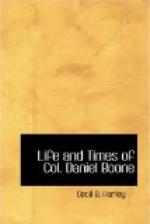“The speech was listened to in unbroken silence. As soon as he had finished, several chiefs expressed their approbation by a deep guttural interjection, while others were equally as forward in making known their objections to the proposal. They urged that his fate had already been determined in a large and solemn council, and that they would be acting like squaws to change their minds every hour. They insisted upon the flagrant misdemeanors of Kenton—that he had not only stolen their horses, but had flashed his gun at one of their young men—that it was vain to suppose that so bad a man could ever become an Indian at heart, like their brother Girty—that the Kentuckians were all alike—very bad people—and ought to be killed as fast as they were taken—and finally, they observed that many of their people had come from a distance, solely to assist at the torture of the prisoner, and pathetically painted the disappointment and chagrin with which they would hear that all their trouble had been for nothing.
“Girty listened with obvious impatience to the young warriors who had so ably argued against a reprieve—and starting to his feet, as soon as the others had concluded, he urged his former request with great earnestness. He briefly, but strongly recapitulated his own services, and the many and weighty instances of attachment he had given. He asked if he could be suspected of partiality to the whites? When had he ever before interceded for any of that hated race? Had he not brought seven scalps home with him from the last expedition? and had he not submitted seven white prisoners that very evening to their discretion? Had he ever expressed a wish that a single captive should be saved? This was his first and should be his last request: for if they refused to him, what was never refused to the intercession of one of their natural chiefs, he would look upon himself as disgraced in their eyes, and considered as unworthy of confidence. Which of their own natural warriors had been more zealous than himself? From what expedition had he ever shrunk?—what white man had ever seen his back? Whose tomahawk had been bloodier than his? He would say no more. He asked it as a first and last favor, as an evidence that they approved of his zeal and fidelity, that the life of his bosom friend might be spared. Fresh speakers arose upon each side, and the debate was carried on for an hour and a half with great heat and energy.
“During the whole of this time, Kenton’s feelings may readily be imagined. He could not understand a syllable of what was said. He saw that Girty spoke with deep earnestness, and that the eyes of the assembly were often turned upon himself with various expressions. He felt satisfied that his friend was pleading for his life, and that he was violently opposed by a large part of the council. At length the war-club was produced, and the final vote taken. Kenton watched its progress with




